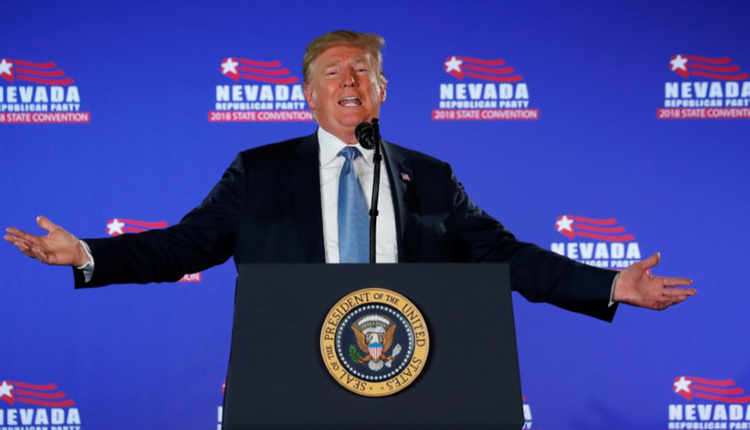Washington will open its doors for the president of the European Commission on Wednesday, with relations looking strained amid tariffs and the possibility of an all-out trade war.
Jean-Claude Juncker, who heads the EU’s executive arm, will meet U.S. President Donald Trump in an attempt to overcome their differences, specifically on car tariffs. Trump wants to increase tariffs on European cars exported to the U.S. to reduce the trade imbalance with the continent. But the EU sees these tariffs as an economic threat and is preparing retaliatory measures.
Just hours prior to the meeting, the EU’s trade commissioner Cecilia Malmstrom told Swedish newspaper Dagens Nyheter that the EU will put tariffs worth $20 billion on U.S. goods if Trump goes ahead with car tariffs. Meanwhile, on Tuesday, the White House said it is preparing a $12 billion aid package for U.S. farmers hit by trade tensions.
“The relations are very tense, are at a very low point,” Danae Kyriakopoulou, the chief economist at the London-based think tank OMFIF told CNBC Tuesday, citing ongoing tensions over defense spending for the NATO alliance, climate change policy and the recently-applied fine on Google by the European Commission.
“It doesn’t set the scene for a very fruitful meeting,” she said, adding that she only expects the meeting to provide “some sort of language that’s mutually accepted.”
‘Drop all tariffs’
Trump will receive Juncker and Malmstrom at 1:30 p.m. ET. The president said Wednesday on Twitter that both sides should drop all tariffs.
“I have an idea for them (the European Union). Both the U.S. and the EU drop all tariffs, barriers and subsidies! That would finally be called free market and fair trade! Hope they do it, we are ready — but they won’t!,” Trump said.
Trump considers the 10 percent European tax on U.S. cars to be too high, compared to the 2.5 percent duty the U.S. applies on European cars. However, Brussels argues that while this is true for cars, it is not the same for trucks, lorries and other items such as shoes and clothes.
Furthermore, the EU’s trade chief Malmstrom explained last month that Europe cannot simply remove the tariffs on U.S. cars overnight, due to World Trade Organization (WTO) rules. These laws dictate that the EU would also have to drop tariffs for every country in the world.
“And I don’t think member states are willing to do that,” she said at a press conference.
Tony Fratto, a founding partner at consultancy Hamilton Place Strategies, told CNBC Tuesday that reducing all car-related tariffs to zero would be a “good agreement” but “it is hard to imagine the Trump administration making that offer.”
“The difficult part is that you hear President Trump continually talking about the differential on autos of 10 percent in Europe and 2.5 percent in the United States, but he conveniently leaves out the 25 percent U.S. tariff on light trucks,” he said.
The current trade tensions between Europe and the U.S. started earlier this year when Trump imposed penalties on steel and aluminum imports, arguing that the overcapacity in the sector posed a national security threat.
Europe argued at the time that its metal industry is not causing the overcapacity in the sector and retaliated with $3.3 billion worth of duties on U.S. products.
‘Harmful for both sides’
Volker Treier, the deputy general manager at the Association of German Chambers of Industry and Commerce, told CNBC ‘s “Street Signs” Tuesday that an escalation into a trade war would be “harmful for both sides.”
“Our understanding is that the Americans are trying to distract us from their own shortcomings in their own country by blaming others for unfair dealings,” he said.
Trump has also imposed tariffs on other countries since the start of the year — including China, Canada and Mexico — on all sorts of goods. Consequently, the U.S. has also been hit with additional duties as those countries retaliate against Trump’s decisions.
Nonetheless, ahead of midterm elections in the U.S. this November, trade tensions could actually be ignored by American citizens.
“There is growing evidence that tariffs and the incipient trade war are hurting parts of Trump’s base, especially midwestern farmers and blue-collar workers. But few will cast a vote based on this issue alone and I therefore don’t expect Trump to back down,” David Bach, deputy dean for academic programs at the Yale School of Management, told CNBC via email.
He added that Democrats might also opt to wait until trade tensions weaken the economy and use that argument to boost their chances in 2020.
Source: CNBC


